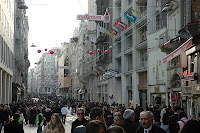Demographics of Turkey
The last official census was in 2000 and recorded a total country population of 67,803,927 inhabitants. According to the Address-Based Population Recording System of Turkey, the country's population was 74.7 million people in 2011, nearly three-quarters of whom lived in towns and cities. According to the 2011 estimate, the population is increasing by 1.35% each year. Turkey has an average population density of 97 people per km². People within the 15–64 age group constitute 67.4% of the total population; the 0–14 age group corresponds to 25.3%; while senior citizens aged 65 years or older make up 7.3%. In 1927, when the first official census was recorded in the Republic of Turkey, the population was 13.6 million.
Life expectancy stands at 71.1 years for men and 75.3 years for women, with an overall average of 73.2 years for the populace as a whole. Education is compulsory and free from ages 6 to 15. The literacy rate was 94.1% in 2010.
Article 66 of the Turkish Constitution defines a "Turk" as "anyone who is bound to the Turkish state through the bond of citizenship"; therefore, the legal use of the term "Turkish" as a citizen of Turkey is different from the ethnic definition. However, the majority of the Turkish population are of Turkish ethnicity. They are estimated at 70–75% by the CIA World Factbook.
The three officially recognized major minorities ethnic groups (per the Treaty of Lausanne) are Armenians, Greeks and Jews. Signed on 30 January 1923, a bilateral accord of population exchange between Greece and Turkey took effect in the 1920s, with close to 1.1 million Greeks moving from Turkey and some 380,000 Turks coming from Greece.Following decades of state-sponsored discrimination, the formerly 110,000-strong Greek community of Istanbul has now shrunk to approximately 3,000.[122][123] Other ethnic groups include Abkhazians, Albanians, Arabs, Assyrians, Bosniaks, Circassians, Georgians, Hamshenis, Laz, Pomaks (Bulgarians), Roma.
The Kurds, a distinct ethnic group concentrated mainly in the southeastern provinces of the country, are the largest non-Turkic ethnicity, variously estimated around 18%. Minorities besides the Kurds are though to make up an estimated 7–12% of the population. Minorities other than the three officially recognized ones do not have specific minority rights, while the term "minority" itself remains a sensitive issue in Turkey and the Government of Turkey is frequently being criticized for its treatment of minorities, with Human Rights Watch stating as of 2012: "The government's 'democratic opening', announced in the summer of 2009 to address the minority rights of the Kurds in Turkey, did not progress."
Minorities of West European origin include the Levantines (or Levanter, mostly of French, Genoese and Venetian descent) who have been present in the country (particularly in Istanbul[126] and İzmir) since the medieval period.
Reliable data on the ethnic mix of the population is not available, because Turkish census figures do not include statistics on ethnicity.
An estimated 71% of the population live in urban centers. In all, 18 provinces have populations that exceed 1 million inhabitants, and 21 provinces have populations between 1 million and 500,000 inhabitants. Only two provinces have populations less than 100,000.
Source:Wikipedia
Subscribe to:
Post Comments (Atom)











0 Comment:
Post a Comment